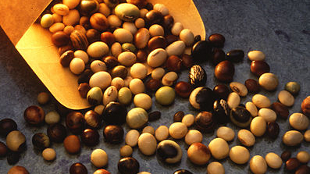 WIKIMEDIA, USDAPeptides derived from soybean meal—the product leftover once oil is extracted from soybean seeds—inhibited the growth of a high percentage of human colon, liver, and lung cancer cells in vitro, according to a study published in the January 2013 issue of Food Research International.
WIKIMEDIA, USDAPeptides derived from soybean meal—the product leftover once oil is extracted from soybean seeds—inhibited the growth of a high percentage of human colon, liver, and lung cancer cells in vitro, according to a study published in the January 2013 issue of Food Research International.
Researchers from the University of Arkansas in Fayetteville isolated gastrointestinal-resistant peptide fragments for two soybean lines high in oleic acid—a monounsaturated omega-9 fatty acid previously found to suppress overexpression of a gene implicated in certain breast cancers—as well another strain high in protein, and tested each against different human cancer cell lines. The peptides from soybeans high in oleic acid inhibited cell growth in 73 percent of colon cancer cells, 70 percent of liver cancer cells, and 68 percent of lung cancer cells tested.
The results suggest that peptides from elected soybean lines “can be a source of bioactivity against cancer cell proliferation,” the authors wrote.




















